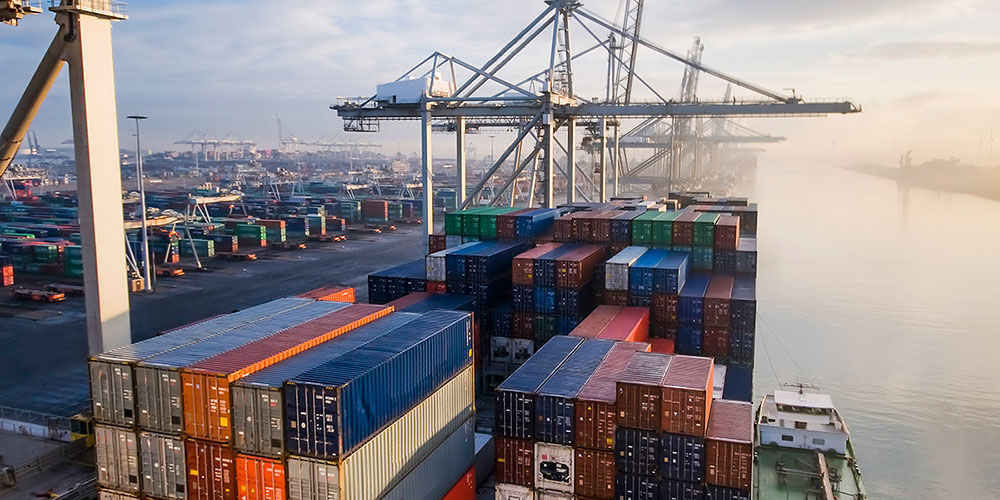Our head of asset allocation Edward Smith notes that Donald Trump has always played the pugnacious attack dog of the anti-trade movement, so his escalating tariff threats shouldn’t come as a surprise. But we’ll be keeping an eye on mounting global trade tensions.

Biting the hand that feeds the consumer
After Donald Trump’s rhetoric in the 2016 Presidential election, you may have hoped protectionism would go quiet… but it wasn’t to be. Many had hoped that Trump’s campaign-trail tirades were just for show, but sadly, recent news would beg to differ. Are the escalating threats of tariffs a more worrying predisposition to bite the hand that feeds the American consumer? And investment returns around the globe?
It’s still too soon to declare the start of a global trade war. The threatened tariffs may not all be carried out. But our position remains clear: nobody wins a global trade war.
Base instincts
Mr Trump’s base of supporters is generally anti-trade and he continues to update his website in support of such views. According to a Pew Institute survey from 2017, only a third of Republican-leaning Americans thought free trade had helped their financial situation and only half of all Democrat-leaning Americans. The President is not constrained by his electorate.
When Trump took office, he made key anti-trade appointments. His Commerce Secretary, Wilbur Ross, and his Trade Representative, Robert Lighthizer, have dedicated most of their careers to lobbying for protectionist measures. Pro-trade moderates, such as former chief economic adviser Gary Cohn, have resigned or lost influence.
Since taking power, the Trump administration has overseen myriad pieces of protectionist legislation that haven’t made the headlines. According to the independent Global Trade Alert initiative, US policy has moved sharply in favour of domestic firms: in the first half of 2017, US policy initiatives hit the commercial interests of G20 partners 26% more often than during the same period in 2016.
Returns at risk
In addition to being potentially bad for consumers around the globe and international relations, the prospect of a descent into a global trade war is one of the biggest risks to investment returns over the next decade. Discontent with globalisation may be widespread, but protectionism is a poor means of alleviating it.
On the face of it, protectionist tariffs provide a large, easy-to-quantify gain to a small but visible and vocal number of people. But they simultaneously deliver a small, hard-to-quantify loss for every member of a large and silent majority. The aggregated impacts of those small losses invariably far outweigh the ostensible gains. According to the US government’s own General Accounting Office, protecting US sugar growers and refiners during the 1990s benefited producers to the tune of $1bn, but cost consumers $1.9bn, or almost double.
In the case of the ‘Trump tariffs’ on steel and aluminium, independent think tank The Trade Partnership has estimated that, taken at face value, the tariffs would add 33,464 jobs in the US metals industry, but cost 179,334 jobs throughout the rest of the economy — a net loss of 146,000 jobs.
While past protectionist measures by Messrs Nixon and Reagan were met with appeasement, in today’s globalised world of trade retaliatory tariffs are a more likely outcome. Furthermore, the US consumer is not as important as it was during the 1970s and 1980s. US household consumption now accounts for 21% of global consumption (adjusted for purchasing power), down 5% over the last 20 years; 18% of Chinese exports go to the US, down from over 34% in 2005. The risk of a tit-for-tat trade war is greater this time, and it would still be systemically significant to financial markets.
The backlash of isolationism
Any country that adopts an isolationist approach while the rest of the world continues to integrate will lose out over the long run. Supporting uncompetitive industries where there is no competitive advantage undermines investment and productivity. Growth in these areas has already slowed considerably across the world, and slower growth usually means lower investment returns.
Free trade has no doubt accelerated the broader process of ‘creative destruction’, in turn bringing greater disruption to working lives. To secure the benefits of trade for future generations, policies that soften the disruption and diffuse the more immediate spoils are badly needed. If they’re neglected, the nationalistic demagoguery of anti-establishment politicians could deliver shock results – to both politicians and investors. We’ll be keeping a close watch as we navigate these turbulent waters.
You can read more on our views on trade and other topical themes in our latest edition of InvestmentInsights, or ask your Rathbones sales representative for a copy.

